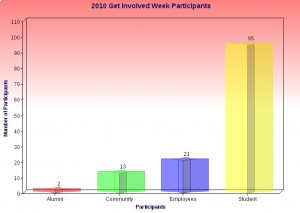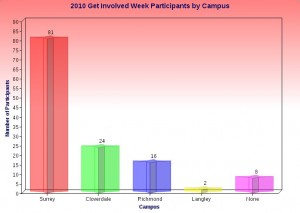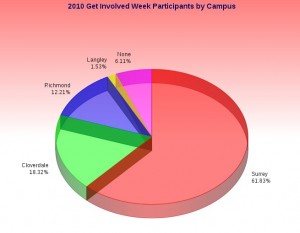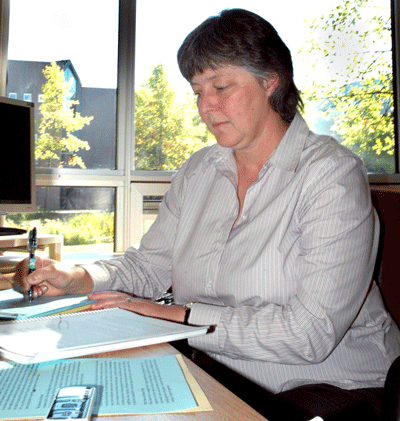Get Involved Week 2010: 63.8 per cent increase in participants
October 3, 2010 by Sarah Casimong · Leave a Comment
Although student life and development fell short of its goal for 300 participants for this year’s Get Involved Week, there has been a 63.8 per cent increase over last year in the number of people involved.
Kwantlen’s annual community-building charity event, which took place Sept. 20-25, had a total of 131 people involved in 32 different activities. Each participant was required to donate a minimum of $10 for Free The Children.
According to Kurt Penner, student life and development coordinator, that is an improvement from the 80 participants last year, 20 employees and 60 students.
Of this year’s 131 participants, 95 were students, 21 were employees, 13 were community members and two were alumni. That is a 58.3 per cent increase in student participation from last year. The Surrey campus had 81 participants, 61.8 per cent of all who got involved, while Langley had the fewest number of participants: two.
The final donation total came to $1,241, $491 more than what was made in 2009.
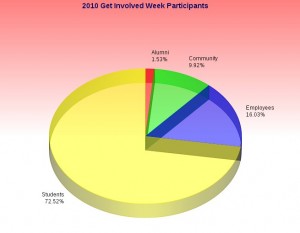
Stress relief for students is a no-brainer
October 3, 2010 by Amanda Punshon · 1 Comment
Stress — The one thing everyone has and no-one wants…It is known to cause suicide, murder, tumours, AIDS, and cancer. So don’t get stressed out, ’cause stress SUCKS! Usually caused by something unfortunate, like death, job loss, woman loss, school, etc..” (Urban Dictionary).
While there is no scientific correlation between stress and tumours, AIDS or cancer, the author of that definition did get two things right: stress sucks, and it’s something we all have to deal with.
There are many different ways to manage it. Dr. Rod Le Blanc, a doctor of traditional Chinese medicine and acupuncturist, takes a drug-free approach. “Deep breathing and stretching has been the most important way to relieve stress for 4,000 years. Five, maybe. You could even say six.”
In addition to deep breathing and stretching, Dr. Le Blanc says that acupressure or massage can help.
“If you can team up with a friend who wants a massage and you want a massage, you can start working along the back of the spine. And do this gently, because some people are more sensitive than others and some people need more pressure than others, so you always have to be aware of who you’re dealing with…You start up at the top, at the C7 vertebrae and go along the spine.”
If you don’t have a friend who can help you, there are many devices that can do the same thing — even the corner of a doorway can be used to apply pressure along the spine, Dr. Le Blanc says.
Deep breathing and a simple mantra
Like Le Blanc, Jas Maan, a pharmacist at Shoppers Drug Mart on Nordel Way in Surrey, recommends deep breathing to relieve stress. “With breathing exercises, there’s also mantras you can use…I know one really popular one by this Vietnamese Buddhist monk; he put out a few books. One of the ones he said, it was a really simple one was “When I breathe in, I’m happy. When I breathe out, I’m relaxed.” And…[it's] as if someone was reassuring you.”
Maan says that moderate to heavy physical activity — activities such as running and hockey — is a great way to calm down. And as always, exercise and diet go hand-in-hand. “A lot of people find during exam season that they’re really blah…and one of the biggest reasons is that people don’t really pay attention to their nutrition. They’re eating X-Y-Z that’s probably more harmful than good. Things like just getting in their fruits and veggies can go a long way.”
There are also a variety of over-the-counter stress-relief aids.
“There’s Vitamin B-100. It’s a complex of vitamin B. It does help many processes of the body to help reduce stress levels,” Maan says. “There’s another herb as well called valerian root, you can take it at about 100-200mg at bedtime as needed.”
If stress is causing you to lose sleep, Maan recommends taking 25 to 50mg of Benadryl, an allergy medication, which contains the same active ingredient as over-the-counter sleep aids, but is much cheaper. Melatonin, a natural sleep hormone, will also help.
‘We’re never going to be stress-free’
Dawn Schell, a counsellor at Kwantlen’s Surrey campus, knows that “we’re never going to be stress-free. We need stress to hold us together as human beings.” She helps students figure out “the point at which it’s too much, it’s over the top and you can’t cope. We don’t want people to get to the point where they’re not coping at all and everything falls through the cracks.”
Schell advises students to make use of the resources available to them. Kwantlen offers seminars in time management, study skills and avoiding procrastination, all of which Schell identifies as causes of student stress. Students can also come in for individual appointments.
“We’re more than happy to help people sit down and figure out what’s going to work for them, what’s going to work in the immediate short-term, but also to help them look ahead to what are some things that they can learn so they can be more proactive in the future as well. Sometimes people just need to come in and let off some steam; they just need to unload somewhere and they can do that here.”
Schell says the first thing anyone has to do to relieve their stress “is learning about stress — how [I] personally respond to it, what’s stressful for [me]…and how does it affect me physically, and also how does it affect me mentally and how does it affect me emotionally. Because if I am the type of person who, for example, where I carry my stresses all physically, so then the body starts to tense up…then I need to learn how to use physical relaxation techniques.
“For some people it’s the brain that’s going. So how do you stop and calm your brain down enough so then you can refocus on whatever it is you need to do? For some people, it’s a combination. Sometimes they have to start with the mind and then go through the body.”
Building a relaxation toolbox
Once you’ve figured out your stress style, Schell advises assembling a personalized toolbox of relaxation techniques. For some people, that may involve setting deadlines or timelines, self-coaching or taking breaks.
“Sometimes it’s just about the mental break when you’re in school. Just let the brain go on neutral for a short period of time,” she says. There are a variety of online resources that students can use to help with deep relaxation.
If you’re already in the midst of a stressful situation, Schell says to “take five minutes and really sit down and figure out what’s the most important thing I need to do?… Maybe I need to back out of something that I’ve agreed to already. Some of it is, ‘How do I pull back a little bit, in a reasonable way?’ And some of that is really having a serious look at, ‘What is my top priority right now, and how can I do that?’”
Schell also advocates taking breaks.”You need to plan some fun or some relaxation or some time just for yourself in the midst of [stressful situations], because nobody can go through 24 hours-a-day, seven days-a-week without a break. That’s why we have eight-hour work days, that’s why people have lunch breaks…they need to build those kinds of opportunities in as well when they’re students. To just take a break and walk away, but know that there’s a time limit.”
Something as simple as getting up and moving around while studying can change the blood flow and wake you up, she says. And “if you really need a good break, find a movie that you find to be funny, or a show or something, because laughter sure helps a lot.”
Some online stress-relief resources
RELATED: Kwantlen students dreaming of more sleep September 29, 2010 by Brian Russell · Leave a Comment [audio:first_podcast.mp3] Kwantlen staff and students took part as a team in the AIDS Walk for Life in Vancouver on Sept. 19. Talysa Dhahan and Brian Russell share interviews from and discuss the walk, and also look at upcoming events students might enjoy. September 27, 2010 by Meagan Gill · 1 Comment Mohamed El-alem shopping for textbooks at the Kwantlen Polytechnic University bookstore in Richmond on Sept. 24. (Photo by Meagan Gill) It’s no secret that textbooks can be expensive, coming on top of tuition and living expenses. For a student relying on a part-time job to cover these costs, having a social life is pretty much out of the question. “Textbooks are extremely expensive, I just paid $512 on textbooks for this semester,” said Kayla Shimbashi. Fortunately, there are some ways students can save a little extra money. If students buy used textbooks through the bookstore, BC bookworm or Craigslist, it’ll keep more cash in their wallets. “If I had bought my textbooks from the bookstore, it would have cost me about $300. But since I got them used off of Craigslist, I only paid like $170 for them,” said Scott Rachel. Out of 20 Kwantlen students interviewed, only five bought their textbooks used. The majority of the students who bought new textbooks new from the bookstore were first-year students. The students who bought their textbooks used off of Craigslist and BC Bookworm were second- and third-year students. Craigslist is one of the most popular sites for buying and selling used textbooks. You can find textbooks for the majority of your courses being sold up to 50 per cent cheaper and most are in great condition. “I buy my textbooks from the bookstore because it’s just really convenient. When I’m done with them, I usually post them up on Craigslist. I’ve sold four out of eight of my old textbooks on Craigslist,” said Jansen Paulino. BC Bookworm is an organization run by students that allows you to buy and sell used textbooks. It’s free to post an ad and the ad stays up for 90 days. The site states it can help students save up to 35 per cent on their textbooks. “I find BC Bookworm really helpful, I used it to buy a few of my textbooks last semester,” said Fei Hyang. Another way to save some money on textbooks is to borrow from friends or split the cost of textbooks with classmates. “I either buy my textbooks at the bookstore or I borrow them from friends who have taken that course,” said Samantha Sunderland. September 27, 2010 by Paul Fleischanderl · 4 Comments Have you ever wondered why Langara College is mentioned as a Canada Line station name (Langara – 49th Ave), but Kwantlen isn’t? At the Communication & Marketing Department of Langara there were no answers. “There was no communication between Translink and Langara. You should ask Translink.” Ken Hardie, Translink’s director of communications, said that the process of naming the stations involved much discussion. Normally stations are named in a way to orientate people and help them to locate what is nearby. “In the case of Langara, the university is a key destination at this station and therefor mentioned,” he said. Joanne Saunders, Kwantlen’s Director of Marketing and Communication, wasn’t working at Kwantlen at the time stations were named, but she was told that there was some discussion about the Lansdowne station being named Kwantlen. “Langara is very lucky to get the free publicity and advertising from the skytrain name,” she said. But — as both Hardie and Saunders said — the final decision rests with Translink and the latter perceived Kwantlen not to be close enough to warrant inclusion in the station name. “The university isn’t associated with Lansdowne as Langara is with 49th Avenue,” Hardie said. A little comparison on Google Maps shows that from Langara station to the main entrance of the college it takes six minutes by foot. From Lansdowne to Kwantlen it is eight minutes. Also, both Langara and Kwantlen serve approximately 20,000 students. But there is hope Hardie said. “If folks from Kwantlen want the university to be mentioned at Lansdowne station we could talk about this.” What do Kwantlen students (and also residents of Lansdowne) think? Voting: Should the Lansdowne station be re-named “Kwantlen – Lansdowne”? (Leave your answers into the comments) September 27, 2010 by Sarah Casimong · Leave a Comment In case of emergency, speaker phones are located on the Surrey, Richmond and Langley campuses. The two-way speaker phone is answered by security personnel and faculties. (Photo by Sarah Casimong) Most students, occupied by the stress of classes, barely have time to think about the safety of their environment at the school. It might take a rare incident before students look into what is provided for them by faculties and what they should do if a threat should occur. Of those asked whether they feel safe at Kwantlen, most students said yes. Many acknowledged the presence of security officers as the main reason for their ease. According to the school website, there are security officers on all four campuses. With the exception of Cloverdale, all campuses have emergency speaker phones students can use to call security personnel. Jayson Bulahan, 19, who is studying criminology at the Surrey and Richmond campuses, has been attending Kwantlen for two years and feels free from harm. “I’m aware that there are security guards [around] the campus area,” said Bulahan. “So far, there hasn’t been any issues within campus that has ever made me feel unsafe.” Chiny Babilonia, 21, taking criminology, had similiar views. “I do feel somewhat safe at night,” said Babilonia. “I used to take night classes at the Surrey campus and after class I don’t feel any danger or harm. Whenever I would walk in the parking lot to go to my car, [knowing that there are] security guards walking around campus when it’s near closing time, [helps me feel] safe.” Some students credited the school’s size as a safety factor. “I feel at ease at school, whether it be night or day,” said Michael Viloria, 20, taking history at both Surrey and Richmond. “I think the school is easy-going, although, the threats may come from the outside. Even so, the school isn’t as big as other universities, so finding help in the security office doesn’t require much effort.” However, not all students feel safe. Michelle Mariano, 27, a psychiatric nursing student, is afraid to walk alone at night. “I don’t see any security around,” said Mariano. “Last semester I had a late class. It’s scary if I have to walk by myself.” For more information on security, visit the security section of the school site. September 25, 2010 by Jeffrey Yip · Leave a Comment An interview with Susan Davidson, vice chair of the Langley Community Farmers Market board of directors, about the farmers market and their partnership with Kwantlen’s Langley campus. For more information visit the Langley Community Farmers Market website. Video by Jeffrey Yip and Matt Law. September 20, 2010 by Brian Russell · Leave a Comment If psychology piques your interest, or if it’s your current field of study, then the Kwantlen Psychology Society might be the perfect organization to join. Of course, if you do fall into one of those two categories, you probably already know about this. The KPS is a “learning community” that holds discussions and events that benefit psychology students. It was created 10 years ago, but this is the first year the KPS has been associated with the Kwantlen Student Association. “I have been involved with the KPS for five years. In this time, I have seen an increase in membership and an increase in the frequency and variety of events,” said Jocelyn Lymburner, one of the faculty advisors for the group. Lymburner also noted that the KPS is the largest student club on campus. That’s significant for a group that focuses on a specific program, but Lymburner and Jamie Rich, president of the KPS, agree that the continued interest in the club is due in large part to the connection psychology students have to psychology faculty and other students. “[The KPS] puts together monthly pub nights…and movies nights where anyone can join us and be part of discussions,” said Rich. APA seminars are organized to give the opportunity for students to hear from a variety of speakers who are part of the psychology community, many of whom teach at Kwantlen. “Events are often attended by both faculty and students, allowing for increased interaction and relationship building with psychology faculty members,” said Lymburner. Amy Baykey, Social Events Coordinator for the KPS, said “anywhere from 20 to 40 people usually attend the [pub and movie nights]” but that those numbers are seeing some growth. Student led study groups are also put together as a way for psychology students to work together outside of KPS events. Mandy Sheppard, Director of Marketing for the KPS, jokingly insists that the study groups not be called “tutoring sessions.” The next KPS pub night will be held on Sept. 22 at Wings in Surrey; anyone is invited to attend. The KPS is also online with Facebook, which you can find by searching Kwantlen Psychology Society, and on Twitter, under the name KwantlenPsycSoc. September 20, 2010 by Miranda Gathercole · 1 Comment Last week, as they returned to Kwantlen campuses for the fall semester, the KSA was busy welcoming new and returning students to school through a host of events at all four campuses. However, not all of the students were feeling the love. At each campus, the KSA had set up of free food booths, information tables, and activities for students to participate in, including a concert by Karl Wolf at Cram Jam 2010 in Surrey. Some students, such as Jenna Robson, felt that most of the events seemed to be concentrated in Surrey. “I didn’t really notice anything here for Welcome Week,” said Robson, a first-year student at the Langley campus. “It seems like all the real stuff, like Cram Jam, happens in Surrey and it’s hard to get there between classes and work.” Rachelle Tomm, also a first-year student, had a similar opinion about Richmond campus activities. “I didn’t really actually participate. I looked outside and saw people jumping and stuff but I didn’t really know what it was for. I didn’t know it was part of welcome week so I just went on to my classes.” But Tomm still enjoyed the events at Cram Jam. “I went to the Karl Wolf concert in Surrey and loved it. His music is awesome, and plus it wasn’t too too busy so I got to go really close to the stage. I just wish the Richmond campus could have that same fun energy as Surrey did.” Related: Welcome Week in photos. September 19, 2010 by Sarah Casimong · Leave a Comment Kwantlen's annual Get Involved - Give Back Challenge Week has over 30 events happening from Sept. 20-25. Each campus hosts different activities, including ice hockey, yoga, dance classes and kickboxing. (Graphic by Sarah Casimong) With more than 30 activities and a good cause to support, Kwantlen’s student leadership and development hopes to see an increase in participation in this year’s Get Involved – Give Back Challenge Week. “[We had] 60 students and 20 employees [involved] last year,” Kurt Penner, coordinator of student leadership and development, said. It was the first time that there were more students than staff involved, and they raised more than $700 for Free The Children’s education campaign. The aim for this year is not only to raise a bit more for the charity, but to also get more people involved. “We’re trying to improve that to 300 [people] this year,” said Penner. “The primary goal is actually the community building. It’s really a secondary goal to generate some funds for charity. If we could raise $1,000, we’d be happy at this point.” The event is an opportunity for students to show their school spirit by participating in challenges and trying a variety of activities. Each campus has its own calendar of events, including yoga, Zumba dance classes, belly dancing, ice hockey and kickboxing. There are also fun challenges like tug-of-war, Scrabble and a turban-tying contest. In addition to campus activities, there are events happening off campus, such as climbing the Grouse Grind. There is a minimum $10 donation fee, 100 per cent of which goes to Free The Children. According to Penner, Free The Children was chosen because the international charity supports young people in underprivileged areas. “Free The Children organization supports educational programs and it seemed like a good step to have the charity be part of something educational,” said Penner. According to the charity’s official site, its goal is to “free children from poverty and exploitation and free young people from the notion that they are powerless to affect positive change in the world.” It has successfully built more than 650 school around the world. Get Involved – Give Back Week starts Sept. 20 and ends Sept. 25. For more information, see the event website.
Podcast: Kwantlen team participates in the AIDS Walk for Life
Students finding ways to save on textbook costs
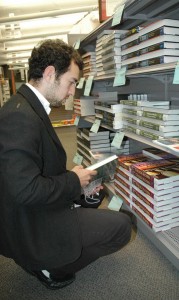
Skytrain station names: ‘The next station could be Kwantlen’
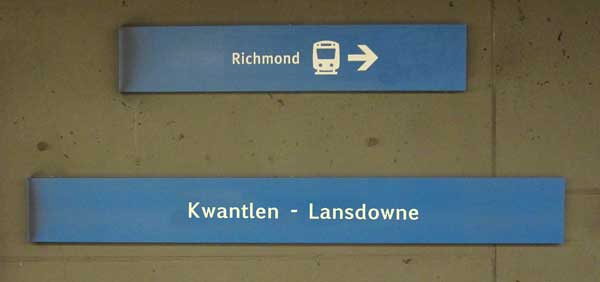
A: Yes, definitely!
B: No, I think this is not necessary.
C: I couldn’t care less!Security officers on campus put students at ease
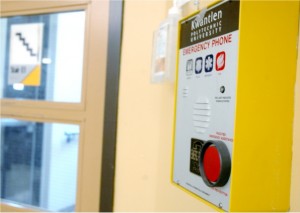
Langley’s farmers market at Kwantlen continues to grow
Kwantlen Psychology Society largest student club on campus
Welcome Week not so welcoming?
SLD hopes to get 300 participants in this year’s Get Involved Week


